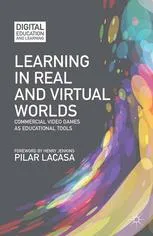Learning in Real and Virtual Worlds: Commercial Video Games as Educational Tools
4.0
Reviews from our users

You Can Ask your questions from this book's AI after Login
Each download or ask from book AI costs 2 points. To earn more free points, please visit the Points Guide Page and complete some valuable actions.Introduction to "Learning in Real and Virtual Worlds: Commercial Video Games as Educational Tools"
In the ever-evolving landscape of education, the intersection of traditional teaching methods and digital technologies has opened up new possibilities for enhancing how we engage with learners. "Learning in Real and Virtual Worlds: Commercial Video Games as Educational Tools" is an exploration of this transformative space. Written with a conviction that commercial video games hold untapped potential as innovative tools for learning, this book bridges the gap between entertainment and education. It provides a comprehensive, research-backed analysis of how real and virtual environments can coexist to foster critical thinking, problem-solving, collaboration, and creativity.
At its core, this book challenges conventional narratives about video gaming and its perceived lack of educational value. Instead, it delves into the mechanics of games, the psychology of play, and their applications in diverse educational contexts. Through case studies, philosophical inquiry, and practical examples, the book empowers educators, researchers, and developers to recognize the pedagogical value inherent in popular video games.
Whether you're an educator hoping to modernize your teaching approaches, a policy maker intrigued by the implications of technology in education, or a gamer curious about the scholarly applications of your favorite pastime, this book offers value for a wide audience.
Detailed Summary of the Book
"Learning in Real and Virtual Worlds: Commercial Video Games as Educational Tools" dives deep into the construct of gaming as a learning framework. The book is divided into several thematic chapters that examine the theoretical underpinnings of learning in gaming contexts, explore specific commercial games, and offer strategies for applying game-based approaches in educational settings. Throughout its pages, the emphasis is placed on how games do not replace, but rather complement, traditional learning methods.
The book examines games like Minecraft, World of Warcraft, and others, breaking down their underlying mechanics and explaining how these foster skills like collaboration, strategic planning, adaptability, and communication. Practical examples include classroom applications, virtual simulations for professional training, and community-building exercises.
Ultimately, the book addresses both the opportunities and challenges, offering a balanced perspective. It acknowledges ethical issues, the digital divide, and the necessity of appropriate teacher training, emphasizing the importance of critical pedagogy in a technology-driven world.
Key Takeaways
- Commercial video games can develop critical 21st-century skills if used strategically in educational environments.
- Games encourage immersion and active engagement, which are pillars of effective learning experiences.
- Learning in real and virtual worlds offers unique benefits, such as promoting creativity and collaboration through interactive problem-solving.
- Educators can use games to mirror real-world challenges, preparing students to think critically and solve complex, real-life problems.
- The book highlights the importance of striking a balance between entertainment and educational goals through thoughtful game design and application.
Famous Quotes from the Book
"Video games are not just sources of entertainment; they are designed ecosystems where players test hypotheses, explore possibilities, and construct their understanding of imagined worlds."
"When leveraged thoughtfully, commercial video games can transform classrooms into dynamic environments where students are not just learners, but active creators."
"The future of education lies in our ability to merge traditional pedagogies with innovative tools that speak the language of modern students."
Why This Book Matters
In a digital-first era, where children and young adults are increasingly engaged with interactive media, understanding the educational potential of video games has never been more crucial. This book emphasizes the positive impact that commercial games can have in fostering real-world competencies when used appropriately. Unlike many critiques of gaming culture, it views video games as more than time-fillers or distractions; they are platforms for meaningful interaction and cognitive growth.
"Learning in Real and Virtual Worlds" also challenges educational institutions to rethink their approach to student engagement. By examining the dynamics of real and virtual worlds, it offers a forward-thinking perspective on how education can be reimagined in the 21st century, making learning more relevant, accessible, and experiential.
The book matters not only to educators and researchers but also to parents, policymakers, and game developers who are keen on understanding how games can contribute to society beyond entertainment. It sends a powerful message: education and entertainment can coexist, and their synergy can lead to impactful, long-term learning outcomes.
Free Direct Download
Get Free Access to Download this and other Thousands of Books (Join Now)
For read this book you need PDF Reader Software like Foxit Reader


